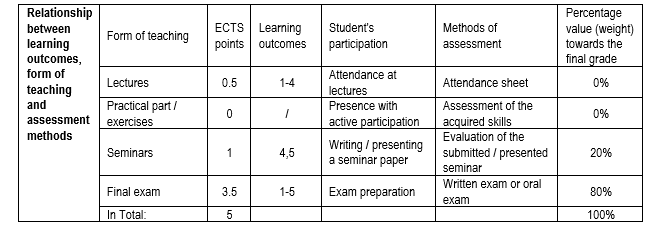Students acquire basic ethical principles of medicine, including modern duty-based guidelines, recognize the importance of health for society and the main public health concepts and approaches, understand the development of medicine and change in views of health and disease through time and universality, internationality, and interdisciplinarity of medicine, and they master the basics of information system and information tools in health care.
Module 1 The first part of this module represents lectures on national and international declarations, conventions, laws and codes with which students would get an insight into medical and dental moral, material and criminal responsibility.
The second part of this module comprises of 15 seminars, which students will perform in groups and during which they will study in detail the selected chapter in medical deontology and get acquainted with some ethical dilemmas faced by the physicians in their practice.
Module 2 Genesis and development of medical ethics; historical aspects of problems of causation of the origin, development and status of bioethics. The foundation of a doctor-patient-companion relationship. Professional aspects of medical ethics, bioethics, deontology and medical law.
Challenges of medical ethics and bioethics in the context of biomedical progress. The actuality of traditional ethical principles. Ethics in organ transplants. Ethics in psychiatry and forced treatment. Ethics in human genetics. Ethics in human reproduction and human procreation. Ethics in reanimatology and intensive treatment. Ethics in paediatrics. Euthanasia and similar forms. The role and importance of national and international regulations in solving current issues in the field of medical ethics and bioethics. The function, status and structure of the ethics committees.
Module 3 Development of medical science and practice through history – from ancient medicine to modern medicine. The achievements of Croatian physicians abroad and some foreign physicians in Croatia, as well as the development of organized medical associations, medical schools and hospitals in Croatia. Encouraging student thinking and motivating students with seminars and excursions.
Module 4 Database. Electronic medical records. Information systems in health care. Signals in medicine. Images in medicine. Telemedicine and Telematics. Support systems for medical decision-making. Security of information and cryptography. Nomenclature and classifications in medicine. Computer networks and the Internet as an infrastructure of scientific information.
Module 5 Introducing students to the relationship between economic laws and the health care system. Acquiring knowledge of the planning process in health care and its importance. Acquiring knowledge of the organisation of health care, basic elements of the health care system, its functioning. Acquiring knowledge of the basic elements of the model of financing health care and basic systems of financing health care in modern countries. Getting acquainted with the characteristics of health insurance in the Republic of Croatia.
Obavezna literatura:
Grmek MD, Budak A, ur. Uvod u medicinu. Zagreb: Globus; 1996.
Kovačić L, ur. Organizacija i upravljanje u zdravstvenoj zaštiti. Zagreb: Medicinska naklada; 2003.
Škrobonj A, Muzur A, Rotshild V. Povijest medicine za praktičare. Rijeka: Adamić; 2003. (izabrana poglavlja)
Dopunska literatura:
Jakšić Ž, Kovačić L, i sur. Socijalna medicina. Zagreb: Medicinska naklada; 2000.
Šercer A, ur. Medicinska enciklopedija. Zagreb: Jugoslavenski leksikografski zavod; 1967.
Upon completion of this course, students will be able to:
1. determine basic medical terminology and professions;
2. argue the role of the history of medicine in medical education and daily work of health professionals;
3. evaluate the characteristics of certain historical periods in the development of medicine and medical practice from its beginnings to the present day;
4. review the concepts of ethics, morals, bioethics, ethical theories, principles and ethical approaches to certain topics;
5. valorize the role of physiotherapist and physiotherapy in the health institution according to ethical principles.



